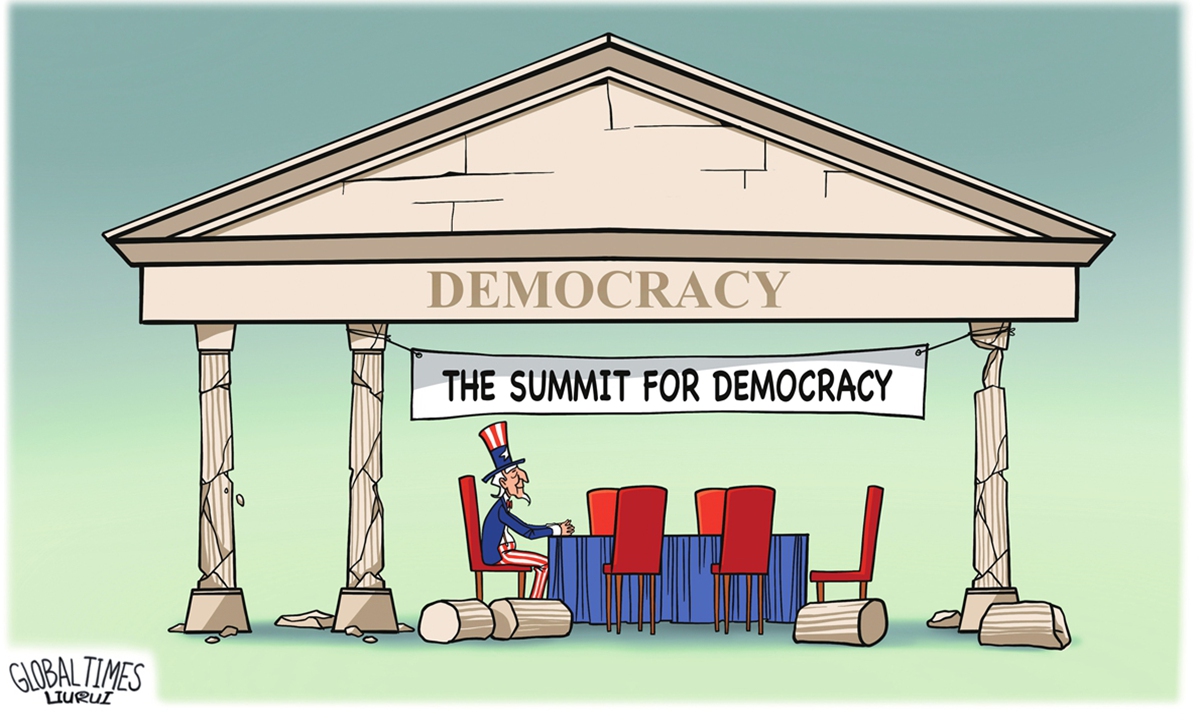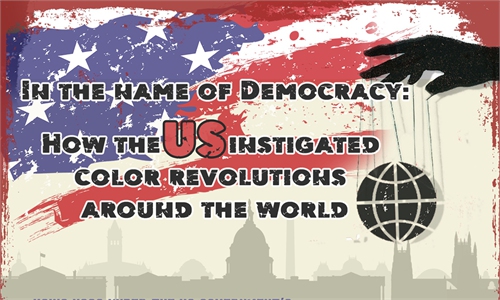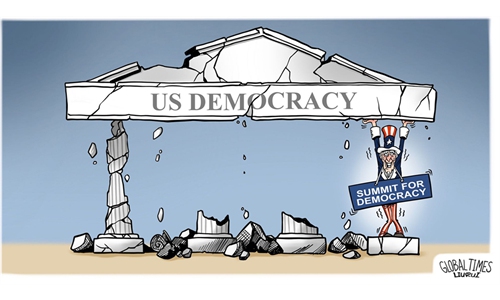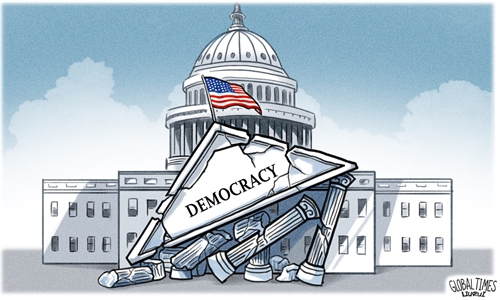
US democracy Illustration: Liu Rui/GT
After taking office, US President Joe Biden has spared no effort to play the soft power card in the face of the sharp decline of the US' hard power.Against this backdrop, the first "Summit for Democracy" will take place on December 9 and 10. It is believed that the US harbors two purposes for hosting the summit. One is to use Western democracy as a link to rebuild the US' alliance system impaired by former president Donald Trump, in a bid to cope with China's development. Another is to revitalize the Western democratic system, which has been losing vitality since the beginning of the 21st century.
The rise of China is a historical inevitability; thus the first US purpose will evidently be futile, and will never succeed. In terms of re-energizing Western democracy, if we analyze the structural reasons for the failure of Western-style democracy, we will easily found this summit will not help at all to change the fated decline of the West.
There are many severe defects in the design of the Western modern democratic system. It can be summarized as the following three.
First, it believes that the public are always right. But once they make a wrong choice, they can never change it. The Brexit referendum in the UK and Trump winning the 2016 presidential election soundly exemplify this defect.
No one can do everything and everyone can make a mistake. But under the Western political system, this reality cannot be faced up to and politicians try their utmost to cater to the voters.
In the 2016 elections the Republican candidate Trump won by pandering to the anti-globalization, anti-free trade and even xenophobic ideas of less educated voters in backward regions.
Under the Western political system, the mass must be rational and intelligent. They should be concerned about the overall interests and future of the country, and well versed in complex international relations. Furthermore, they should harbor willingness to sacrifice their own vital interests for the sake of others and for the country when necessary. But such people do not exist.
Second, rights must be consistent with responsibilities. But under the Western political system, the public have huge rights to decide who will become the leader of the country, but they have no responsibility for exercising this right.
When voting to choose which candidate will be their next national leader, quite a few voters lack basic knowledge regarding the candidates as well as their proposals. When it comes to a referendum, the significance of the subject should be fully understood but often isn't.
In 2016, when the British voted to decide whether to leave or stay in the EU, many of them were not aware of what the EU is. According to media reports, after the Brexit, Google trends showed that "what is the EU" unexpectedly became the second-searched EU-related question in the UK.
Third, the original intention of party competition is against human nature. The Western multiparty systems were designed to push the ruling party to achieve better governance through party competition. By virtue of supervision from the opposition party, it is hoped that the ruling party makes few or even no mistakes.
However, any party wants to become the ruling one. The more and severer mistakes the ruling party makes, which makes it unpopular with the public, the more likely that the opposition becomes the ruling one. As a result, the good initial aspirations have evolved into today's grave party competition, and the interests of the political parties have surpassed the interests of the country and the nation.
The effectiveness and authority of Western governments are declining as party competition becomes increasingly fierce and extreme.
Apart from the three above-mentioned drawbacks, there is also a major inherent structural problem in the Western institutional system - such model cannot maintain the unity of a multi-ethnic country.
Several Western countries are encountering the threat of national disintegration: There are independent moves in Quebec, Northern Ireland, Scotland, the Basque Country and Corsica and so on.
For some developing countries, once they move toward the Western democracy path, a first disaster is often the disintegration of the country. The Soviet Union, Yugoslavia and Czechoslovakia are among the examples.
Western democracy does not help in establishing national and ethnic identity. On the contrary, it facilitates ethnic and national divisions. For one, the Western democratic system contains self-determination, which stimulates and fosters the independent will of ethnic minorities. For another, the constant elections have repeatedly reinforced the self-awareness of different groups, rather than the national consciousness.
It is the structural defects of the system that is the real root of the crisis and predicament of Western democracy.
The vitality of a system lies in its capability to adapt to the development and needs of the times and to address the problems arising from the changes of the times. Western modern democracy was born in the 17th century, when there were no factors such as the role of political parties, mass media, economic power and mass psychology. The Western system model once withstood the test of the times. But this time, at least so far, its power to reform has not been seen.
When a system fails and cannot be reformed, it will inevitably be discarded by history. History will prove that the US' Summit for Democracy will be nothing more than a countercurrent farce.
The author is a research fellow at the China Institute, Fudan University. opinion@globaltimes.com.cn

US democracy Illustration: Liu Rui/GT
After taking office, US President Joe Biden has spared no effort to play the soft power card in the face of the sharp decline of the US' hard power.Against this backdrop, the first "Summit for Democracy" will take place on December 9 and 10. It is believed that the US harbors two purposes for hosting the summit. One is to use Western democracy as a link to rebuild the US' alliance system impaired by former president Donald Trump, in a bid to cope with China's development. Another is to revitalize the Western democratic system, which has been losing vitality since the beginning of the 21st century.
The rise of China is a historical inevitability; thus the first US purpose will evidently be futile, and will never succeed. In terms of re-energizing Western democracy, if we analyze the structural reasons for the failure of Western-style democracy, we will easily found this summit will not help at all to change the fated decline of the West.
There are many severe defects in the design of the Western modern democratic system. It can be summarized as the following three.
First, it believes that the public are always right. But once they make a wrong choice, they can never change it. The Brexit referendum in the UK and Trump winning the 2016 presidential election soundly exemplify this defect.
No one can do everything and everyone can make a mistake. But under the Western political system, this reality cannot be faced up to and politicians try their utmost to cater to the voters.
In the 2016 elections the Republican candidate Trump won by pandering to the anti-globalization, anti-free trade and even xenophobic ideas of less educated voters in backward regions.
Under the Western political system, the mass must be rational and intelligent. They should be concerned about the overall interests and future of the country, and well versed in complex international relations. Furthermore, they should harbor willingness to sacrifice their own vital interests for the sake of others and for the country when necessary. But such people do not exist.
Second, rights must be consistent with responsibilities. But under the Western political system, the public have huge rights to decide who will become the leader of the country, but they have no responsibility for exercising this right.
When voting to choose which candidate will be their next national leader, quite a few voters lack basic knowledge regarding the candidates as well as their proposals. When it comes to a referendum, the significance of the subject should be fully understood but often isn't.
In 2016, when the British voted to decide whether to leave or stay in the EU, many of them were not aware of what the EU is. According to media reports, after the Brexit, Google trends showed that "what is the EU" unexpectedly became the second-searched EU-related question in the UK.
Third, the original intention of party competition is against human nature. The Western multiparty systems were designed to push the ruling party to achieve better governance through party competition. By virtue of supervision from the opposition party, it is hoped that the ruling party makes few or even no mistakes.
However, any party wants to become the ruling one. The more and severer mistakes the ruling party makes, which makes it unpopular with the public, the more likely that the opposition becomes the ruling one. As a result, the good initial aspirations have evolved into today's grave party competition, and the interests of the political parties have surpassed the interests of the country and the nation.
The effectiveness and authority of Western governments are declining as party competition becomes increasingly fierce and extreme.
Apart from the three above-mentioned drawbacks, there is also a major inherent structural problem in the Western institutional system - such model cannot maintain the unity of a multi-ethnic country.
Several Western countries are encountering the threat of national disintegration: There are independent moves in Quebec, Northern Ireland, Scotland, the Basque Country and Corsica and so on.
For some developing countries, once they move toward the Western democracy path, a first disaster is often the disintegration of the country. The Soviet Union, Yugoslavia and Czechoslovakia are among the examples.
Western democracy does not help in establishing national and ethnic identity. On the contrary, it facilitates ethnic and national divisions. For one, the Western democratic system contains self-determination, which stimulates and fosters the independent will of ethnic minorities. For another, the constant elections have repeatedly reinforced the self-awareness of different groups, rather than the national consciousness.
It is the structural defects of the system that is the real root of the crisis and predicament of Western democracy.
The vitality of a system lies in its capability to adapt to the development and needs of the times and to address the problems arising from the changes of the times. Western modern democracy was born in the 17th century, when there were no factors such as the role of political parties, mass media, economic power and mass psychology. The Western system model once withstood the test of the times. But this time, at least so far, its power to reform has not been seen.
When a system fails and cannot be reformed, it will inevitably be discarded by history. History will prove that the US' Summit for Democracy will be nothing more than a countercurrent farce.
The author is a research fellow at the China Institute, Fudan University. opinion@globaltimes.com.cn



